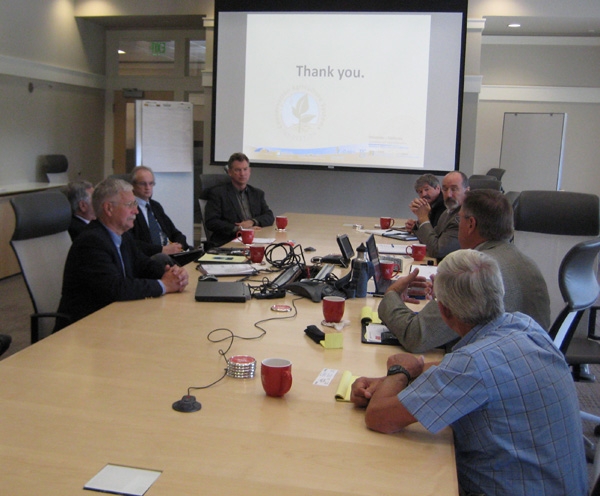CASI seeks collaborative partnership with the Water for Food Institute
UC's Conservation Agriculture Systems Innovation (CASI) proposed the idea of creating a formal partnership with the University of Nebraska, Lincoln, Water for Food Institute at a meeting May 29 with Water for Food executive director Roberto Lenton and senior research scientist Marc Andreini. The proposal will be taken under consideration over the next 12 months as Water for Food and CASI continue to develop programs that enhance agricultural productivity while minimizing water use, ag production cost and environmental impacts.
Seven CASI representatives traveled to Nebraska for the annual Water for Food Conference, May 30 to June 2. The group arrived early to reach out to Water for Food leaders.
CASI chair Jeff Mitchell, UC Cooperative Extension specialist in the UC Davis Department of Plant Sciences, said a partnership between Water for Food and CASI would be designed to foster:
- Information exchange activities
- Focused joint research and demonstration activities on improving the efficiency of water use in agriculture through the development of new technologies for diverse crops
- Student training exchange programs
- International conservation agriculture and precision irrigation training programs
- An opportunity to achieve greater impact to accelerate the adoption of improved systems
Water for Food is a research, education and policy analysis institute committed to helping the world efficiently use its limited freshwater resources, with particular focus on ensuring the food supply for current and future generations. CASI is seeking to launch an effort that combines research, demonstrations and outreach to increase adoption of conservation agriculture systems in California, systems that ensure maximum water use efficiency.
California farmers, like growers in many important agricultural areas around the world, have developed successful food production systems but aren't always interested in investing in the latest technology. The lost food production potential is enormous.
"If all the known technologies were adopted throughout the world, we likely wouldn't be seeing the social problems and hunger problems we see today," said Ron Harben, a member of the CASI executive board and director of the California Association of Resource Conservation Districts. "California can be an implementation laboratory for global efforts. Once we know how to successfully effect change, this process can be duplicated in other countries."
A mainstay in conservation agricultural systems is the use of overhead mechanized irrigation, such as center pivot. Nebraska has been a leader in implementation of these systems and is the home of four major mechanized irrigation systems manufacturers. Nebraska boasts 85,000 center pivot irrigation systems; only several hundred are being operated in California.
A growing body of research has shown significant economic and environmental benefits of mechanized irrigation, especially when combined with conservation tillage practices.
CASI executive board member Dan Schuler, sales manager for Senniger Irrigation Company, suggested one reason California farmers have been slow to adopt overhead irrigation is the proximity of drip and micro sprinkler irrigation dealers on the West Coast. Less than enthusiastic interest in conservation tillage may stem from its origin as a solution for erosion problems. The Central Valley of California is flat and receives negligible summer rain. No serious erosion problems are perceived in the Golden State.
Currently, more than half of California farmland is flood irrigated. A significant portion is irrigated with drip systems and micro sprinklers, but these are mainly permanent crops.
Among CASI's goals will be overcoming misperceptions and traditions and finding the right incentives for farmers to implement new technologies. The organization is now actively seeking support for its educational, research and information campaigns.
Water for Food executive director Lenton noted that the issue of encouraging Nebraska farmers to adopt center pivot irrigation systems has been addressed. Now, scientists are looking for ways to finesse even more efficiencies using advanced technologies.
"In California, the issues are more similar to the rest of the world," Lenton said. "There would be a real value in such as partnership."

The California delegation along with Water for Food senior research scientist Marc Andreini and executive director Roberto Lenton.

